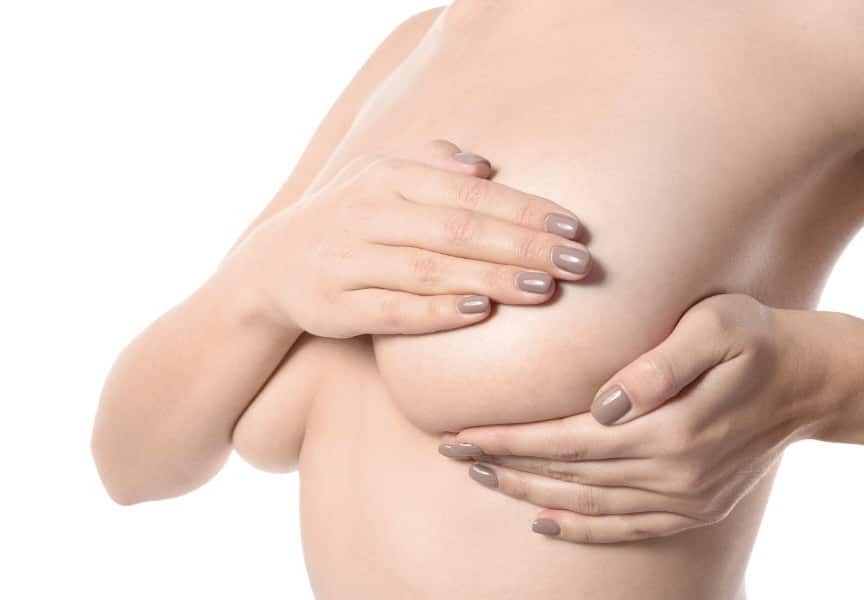How To Treat Nipple Pain After Breast Augmentation
Written by: Dr. Dahlia Rice. Posted in: Blog

Have you ever dreamed of undergoing a breast augmentation to reshape your chest, but were afraid of the impact it may have on your nipple sensitivity? Or, maybe you’ve already had plastic surgery and are struggling to cope with ongoing nipple discomfort? No matter the case, our team is here to help.
Nipple sensitivity is one of the most common (and most unpleasant) side effects of undergoing breast augmentation surgery. In fact, the vast majority of women experience some form of discomfort in the nipple area during the healing process. Thankfully, this uncomfortable nipple sensation will resolve as the body adjusts, and there are many methods you can use to alleviate nipple soreness and help your breasts feel back to normal in no time.
Table of Contents
ToggleWhat Is Breast Augmentation Surgery?
Breast augmentation is an umbrella term that refers to a few different cosmetic surgery options for enlarging and reshaping the size of a woman’s breasts. Most patients seek out breast augmentation to create an enhanced feminine appearance, especially if their breasts have been altered from pregnancy, breast feeding, or drastic weight loss.
Types of Breast Augmentation:
Breast Implants
The most common breast augmentation surgery involves breast implants, which are inserted into the breast tissue to increase to a larger breast size. Today, there are several types of implants to choose from, including silicone, saline, and “gummy bear” implants.
If you choose to undergo this type of procedure, make sure you’re working with a board certified plastic surgeon who understands your overall aesthetic goals. Depending on the look you want to achieve, the implant placement and implant size can have a huge impact on your breast augmentation results.
For example, if you end up with too large implants, it can lead to extreme pain in the breast area, including the nipples. Improper placement can also lead to an unwanted amount of scar tissue, which leads to even more complications later down the line.
Breast Lift
Alternatively, many women opt for a breast lift, which can create some of the same results as a breast implant with fewer risks. During a breast lift, the surgeon will remove excess skin from the body and use it to reshape the patient’s breast area. Many patients feel that this approach creates a more natural-looking appearance, especially for women who have lost some of their original breast shape due to pregnancy.
Breast Augmentation & Nipple Discomfort
Breast implants and breast lifts are both safe and effective ways to enhance your breast size, but that doesn’t mean you won’t have any side effects. Many women experience nipple sensitivity after breast augmentation surgery, particularly in the first few weeks of the recovery process.
This type of nipple sensation isn’t exclusive to breast augmentation patients either, as it’s often reported after women undergo surgery due to breast cancer. That’s because the nipple area contains hundreds of nerve endings, which are responsible for sexual pleasure. After breast surgery, women have experienced an increase in nipple sensitivity, resulting in sensations like:
- Shooting pains
- Nipples that are too sensitive to touch
- Swelling or tightness in the chest muscle or pectoral muscles
As these nerve endings heal during the recovery period, the sensation returns to normal.
Alternatively, some patients find decreased nipple sensitivity to be an issue. If the nerves have been damaged during the procedure, it may cause a lack of sensation that makes it hard to experience the same levels of pleasure as before. If this happens, you should consult with your surgeon immediately to evaluate these complications.
Other Breast Augmentation Side Effects:
Of course, nipple sensitivity after breast surgery is not the only potential side effect. Some breast augmentation patients report experiencing:
- Swelling
- Infection at the breast implant incision site
- Excessive scar tissue
- Burning sensation
Typically, these side effects with be resolved leaving the patient with the final results they deserve. In extremely rare cases, these issues may persist for a few months and additional procedures may be required.
How To Treat Nipple Sensitivity
You don’t have to suffer from sensitivity after breast augmentation on your own. There are many at-home remedies you can use to ease nipple discomfort and eliminate sensitivity problems as your body heals. Some of the best methods include:
Band Aids
If your nipples have become too sensitive to be touched, applying a cover like a band-aid might do the trick. This prevents your nipples from rubbing against harsh materials and allows you to heal comfortably.
 Breast Massage
Breast Massage
For cases of extreme soreness and nipple aching, a gentle massage is a great way to alleviate discomfort. This can also support your nerves as they recover from surgery by increasing blood flow to the affected areas and reducing tightness in the chest.
Topical Treatments
If necessary, your surgeon may recommend OTC topical treatments for pain management. These are often creams and lotions that are specially formulated for the nipples, creating a soothing sensation and keeping the nipples from becoming dried or cracked.
Anti Inflammatory Drugs
Inflammation is very common in all surgeries, and breast augmentation is no different. As part of your recovery, the doctor may prescribe you pain medication and anti inflammatory drugs to reduce swelling in the breasts and resolve additional sensitivity.
Frequently Asked Questions:
How long should nipple tenderness last after breast augmentation surgery?
Extreme nipple sensitivity after breast augmentation should only last for the first few weeks and may be mild for a few months afterward. Your plastic surgeon should provide you with a realistic recovery timeline, so you can be prepared.
What does capsular contraction pain feel like?
Capsular contracture signs usually manifest 3-6 months post breast augmentation. Key symptoms include implant tightness, hardness, and distorted breast shape.
What if my nipple pain doesn’t go away?
When nipple pain doesn’t go away, it may be an indication of more serious side effects like tissue build-up. In this case, you need to contact your surgeon immediately to determine the best way to address your concerns.
Schedule A Cosmetic Surgery Consultation Today
You deserve to look at feel like your best, and the team at DMR Aesthetics is here to support your breast augmentation journey. Dr. Dahlia Rice and her surgical staff and experts at enhancing and shaping the chest area, and they’ve helped countless women achieve the body of their dreams with minimal side effects.
Connect with our office to schedule a consultation today.
References
- https://www.mayoclinic.org/tests-procedures/breast-augmentation/about/pac-20393178#:~:text=Breast%20augmentation%20%E2%80%94%20also%20known%20as,the%20breast%20for%20various%20conditions.
- https://my.clevelandclinic.org/health/diseases/15469-breast-pain-mastalgia

 Breast Massage
Breast Massage